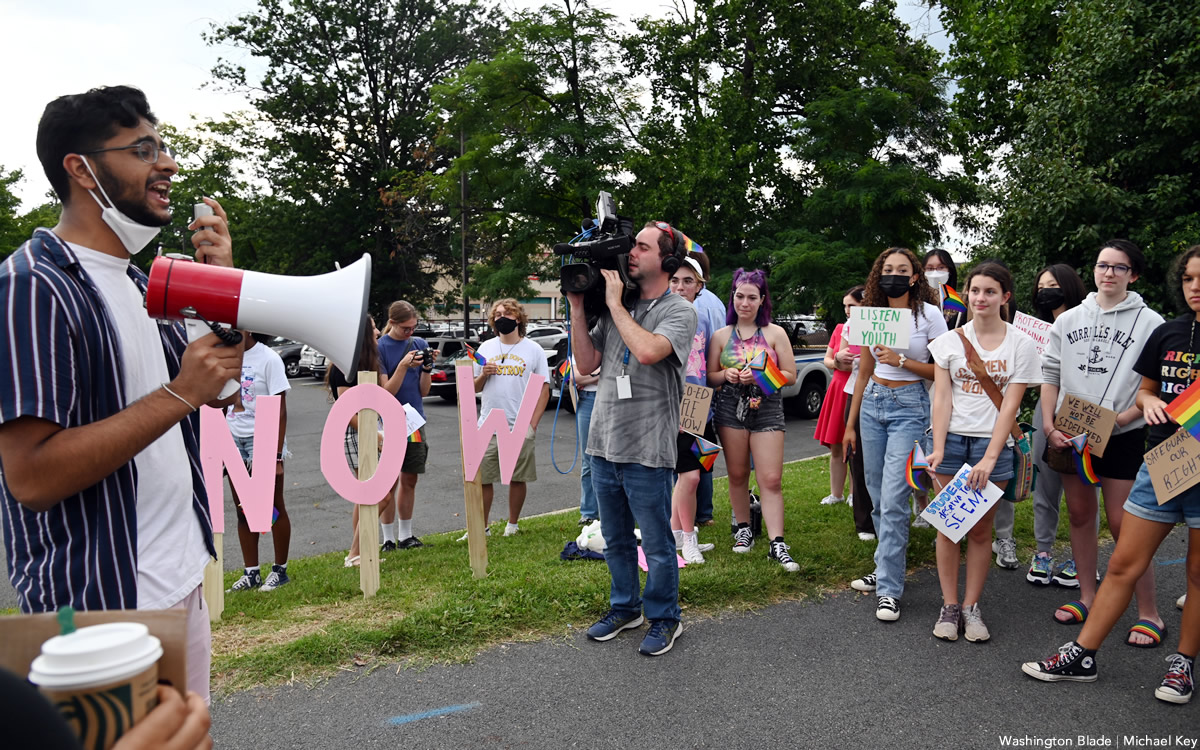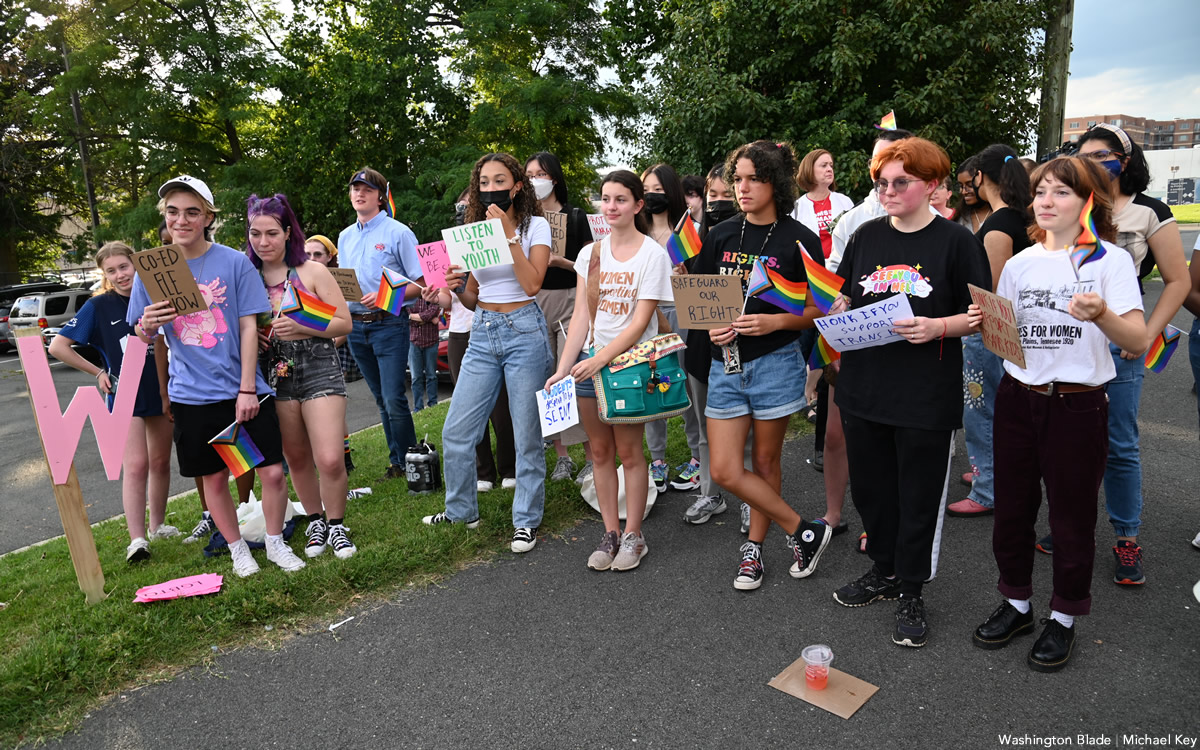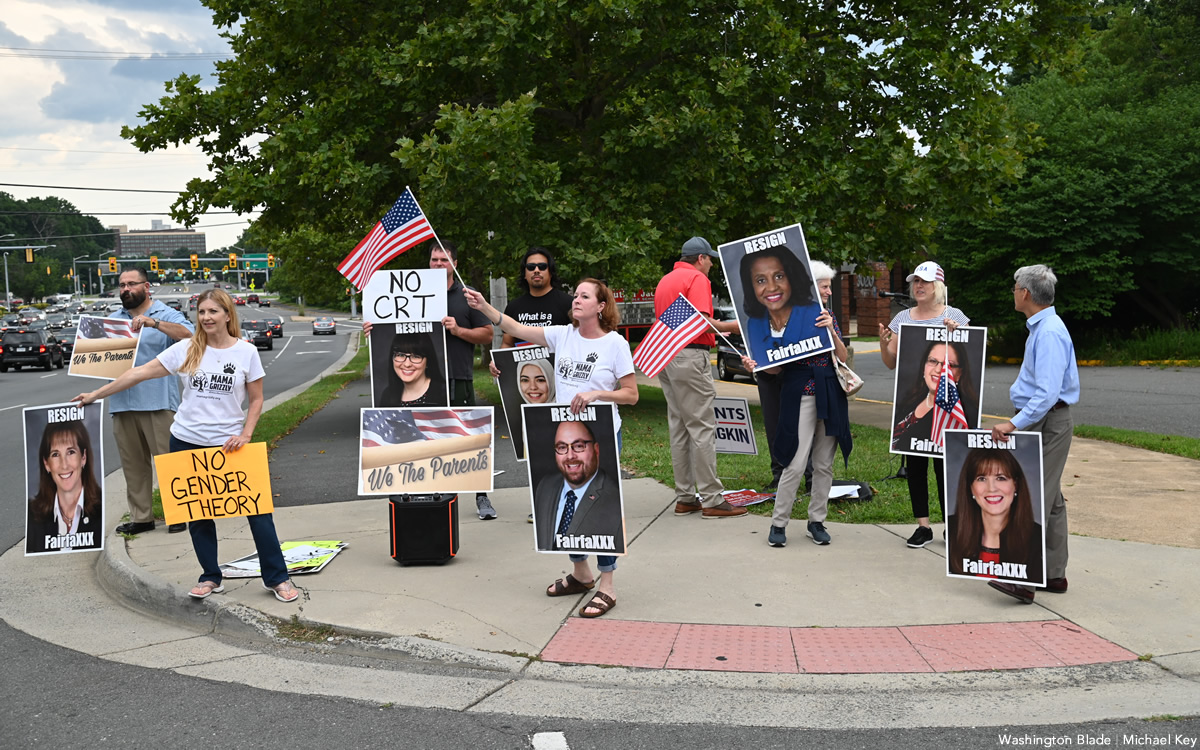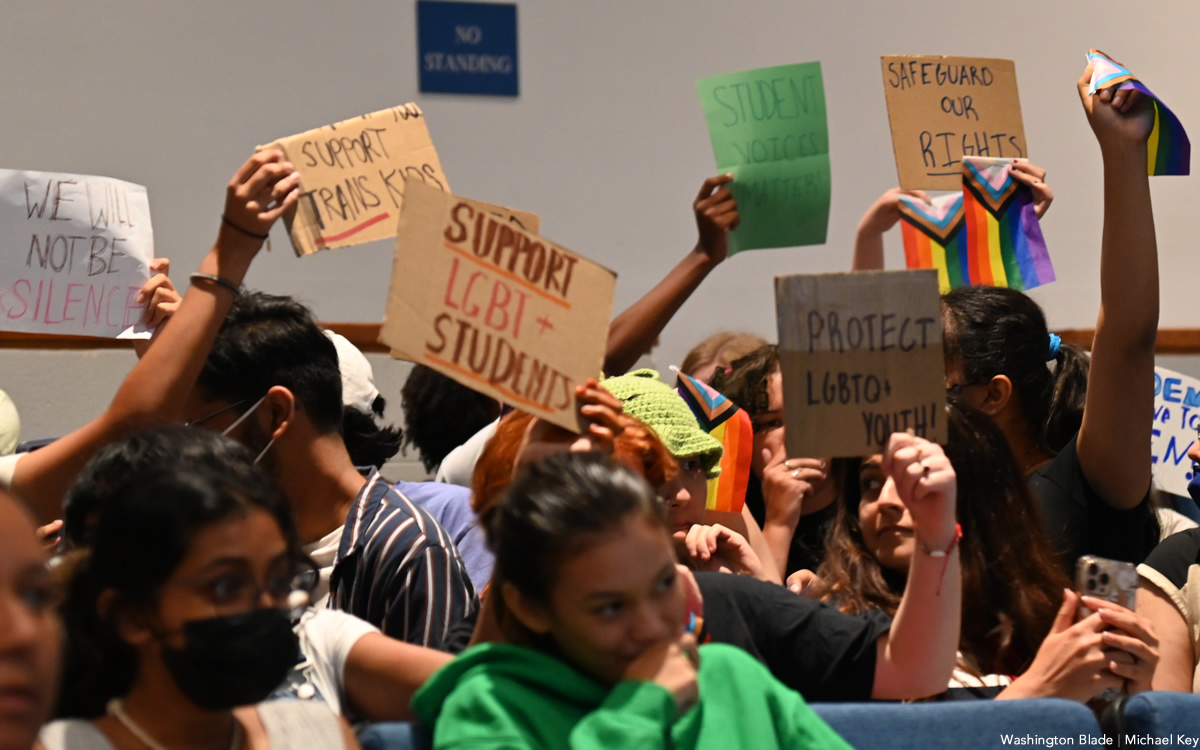Virginia
Student protesters in Fairfax County call for inclusivity
FCPS youth activists rally, speak to urge implementation of coed Family Life Education classes

Student activists and community supporters of the Pride Liberation Project rallied outside of Luther Jackson Middle School in Falls Church, Va., on Thursday ahead of a Fairfax County School Board meeting.
A group of about 50 students, teachers, and supporters gathered on the sidewalk along Glebe Road holding signs and chanting to call for the Fairfax County Public Schools (FCPS) to adopt a gender neutral or “coed” Family Life Education (FLE) program for certain subjects in the curriculum. FLE is the sex education program in Fairfax County.
The activists assert that a coed FLE program would be beneficial to students, particularly for transgender and nonbinary students. Activists agreed with the recommendations of the FLE Curriculum Advisory Committee.
The Family Life Education Curriculum Advisory Committee (FLECAC) is comprised of members of the school board, representatives from the student body, representatives from the community and representatives from teachers and administrators in FCPS. FLECAC recommended that certain lessons be coed in its 2021-2022 Recommendations to the School Board report.
However, the Fairfax County School Board opted to postpone a vote on whether to introduce gender neutral FLE classes for certain subjects along with other changes to the curriculum proposed by the advisory committee at a work session in May.
“FLECAC recommended that we create gender neutral FLE unanimously,” Aarayn Rawal, a student activist with the Pride Liberation Project told the crowd. “But this school board will not choose to ratify that. What they chose to do instead is to kick the can down the road because they are too scared of queer children having rights in our school system.”
“We’re trying to ensure that all people are represented in the way they want to be seen in schools: one of the places they spend time the most,” said a student who identified herself as Natasha. “I think that we need coed FLE in order to promote equality and more importantly, equity among all students regardless of their gender, their sexual orientation, their race.”
“Today we’re fighting for the right for people to have bodily autonomy to make their own decisions about their own body,” the student organizer of the protest Rivka Vizcardo-Lichter told the Blade. “But specifically with the school board we’re fighting so that they adopt the FLE reforms that FLECAC has suggested, especially the one to adopt coed FLE into the curriculum. That is, that there is no gender separation within the classes. This is a step toward inclusivity for transgender and nonbinary students but moreover, if this was accepted, it would show that the board is willing to take a step further and — possibly in the future — broaden the FLE curriculum to include queer students. “

A smaller group of conservative adult demonstrators gathered on the sidewalk outside of the school board meeting. The group stood in front of a “Parents for Youngkin” yard sign and had a public address system with songs such as David Lee Roth’s “Just a Gigolo” blaring out to the assembled crowds: many in the opposing crowd down the sidewalk being underage students. The group held aloft signs calling for the resignation of members of the Fairfax County School Board including gay member Karl Frisch.

Following the protest outside, members of the Pride Liberation Project, Fairfax NAACP and FCPS Pride as well as adversaries from right-wing groups such as Mama Grizzly entered the auditorium of Luther Jackson Middle School to attend the Fairfax County School Board meeting.
Several speakers at the community participation segment of the meeting spoke in favor of gender neutral Family Life Education.
“The fact remains, queer students are struggling,” rising FCPS senior Inaayah Kahn addressed the board. “We have been struggling. We are fighting for our right to be heard, to be represented, to be able to feel safe. Almost constantly, I have friends who get called slurs regularly, I have friends who keep forgiving casual homophobia because the person just ‘didn’t know better.’ I shouldn’t have to say this, but this shouldn’t be happening.”
“I have sat through countless FLE classes throughout my years in FCPS,” Kahn continued. “We started out by being divided by gender: girls in one room, boys in the other, and there was a distinct lack of discussion of trans, nonbinary, and queer identities.”
“Queer students are not seeing themselves represented in our curriculums,” said Kahn. “Queer students are feeling dysphoric in these classrooms. And queer students need gender neutral FLE desperately.”
“Your FLECAC committee has recommended coed FLE classes, yet they still have not been established,” admonished Kahn. “Trans and non-binary students are living in a world that keeps growing more and more hostile toward their identities. And currently, the board is not helping them.”
FCPS student and organizer of the Pride Liberation Project Vizcardo-Lichter was recognized to speak at the podium. “If you’ve heard of the Pride Liberation Project, you’ve probably heard this statistic about a million times,” Vizcardo-Lichter said. “Fifty percent of students in FCPS are depressed. And, at this point, you are probably tired of hearing it but I’m here to tell you why it is essential that you don’t ignore this.”
Vixcardo-Lichter and other speakers referred to the Fairfax County government survey that found 50 percent of self-identified LGBTQ youth in Fairfax County Public Schools from the Fall semester of 2019 experienced depressive symptoms compared to 26 percent of their heterosexual classmates. Further, the survey found that 32 percent of self-reported LGBTQ students had contemplated suicide compared to 11 percent of their heterosexual peers.
“You have a choice: to continue to exclude queer students from their own FLE classes and further the statistic, or you can take a step toward inclusivity by adopting the reforms suggested by FLECAC,” concluded Vizcardo-Lichter.
“If you implemented the reforms suggested by FLECAC, you’ll be taking a small but meaningful step toward accepting queer students,” rising senior Cathy Le said, addressing the board. “If not, the status quo of hate and fear directed toward the queer community will never change. I hope that the decision to do what’s right is unanimous.”

Not all speakers during the community participation segment of the school board meeting were in support of FLE, coed or otherwise.
Kathleen Mallard, wearing a ‘Mama Grizzly’ T-shirt, denounced the Family Life Education program for a number of unsubstantiated claims when she spoke before the school board.
“I was very concerned when my daughter in 12th grade, no 7th grade, was going to learn about beastiality,” Mallard said at the podium. “You know, I didn’t know. Fisting. Whatever. I didn’t know what that was. So anyway, I joined this group.”
Virginia
Fellow lawmakers praise Adam Ebbin after Va. Senate farewell address
Gay state senator to take job in Spanberger administration

Gay Virginia state Sen. Adam Ebbin (D-Alexandria) delivered his farewell address on Feb. 16 in the Senate chamber in Richmond following his decision to resign from his role as a lawmaker to take a position as senior advisor to Democratic Gov. Abigail Spanberger.
Ebbin, whose resignation was to take effect Feb. 18, received a standing ovation from his fellow senators. Several of them spoke after Ebbin’s address to praise him for his service in the Virginia Senate from 2012 to 2026.
Ebbin first won election to the Virginia House of Delegates in 2003 as the first openly gay member of the General Assembly. He served in the House of Delegates from 2004 to 2012 before winning election to the Senate in 2011.
His Senate district includes Alexandria and parts of Arlington and Fairfax Counties.
“Serving in this body has been the greatest honor of my life,” Ebbin said in his farewell address. “Representing Northern Virginia in the General Assembly — my adopted home since 1989 — has been a responsibility I never took lightly,” he said.
“We are a 406-year-old institution,” he told his fellow lawmakers. “But, when I arrived, I had the distinct honor of being a ‘first’ in the General Assembly,” he said. “Being an openly gay elected official 22 years ago didn’t earn you book deals or talk show appearances — just a seat in a deep minority across the hall.”
Ebbin added, “Still, being out was a fact that felt both deeply personal and unavoidably public. I was proud, but I was also very aware that simply being here carried a responsibility larger than myself.”
Ebbin has been credited with playing a lead role in advocating for LGBTQ rights in the General Assembly as well as speaking out against anti-LGBTQ proposals that have surfaced during his tenure in the legislature.
In his speech he also pointed to other issues he has championed as a lawmaker; including strengthening education programs, expanding access to healthcare, safeguarding the environment, and legislation to help “stand up for working people.”
Among the LGBTQ rights legislation he pushed and mentioned in his speech was the Virginia Values Act of 2020, which bans discrimination based on sexual orientation and gender identity, among other categories.
“I’m particularly proud of our work ensuring Virginia modernized state law to protect LGBT people from discrimination in their daily lives, including in employment, housing, and public accommodations,” he said in his speech. “The Virginia Values Act of 2020 — my proudest achievement — established new protections for all Virginians,” he said.
“This law, the first of its kind in the South, passed with strong bipartisan support,” he stated. “And now — this November — after 20 years, Virginians will finally be able to vote on the Marriage Equality Amendment, which will protect the ability to marry who you love. It’s time for our state constitution to accurately reflect the law of the land.”
He was referring to a proposed state constitutional amendment approved by the General Assembly, but which must now go before voters in a referendum, to repeal a constitutional amendment approved by the legislators and voters in 2006 that bans same-sex marriage.
The U.S. Supreme Court’s Obergefell ruling legalizing same-sex marriage nationwide voided the Virginia same-sex marriage ban. But Ebbin and LGBTQ rights advocates have called on the General Assembly to take action to repeal the amendment in case the Supreme Court changes its ruling on the issue.
In his new job in the Spanberger administration Ebbin will become a senior advisor at the Virginia Cannabis Control Authority, which regulates policies regarding marijuana possession and distribution.
Ebbin was among the lead sponsors of legislation in 2020 to decriminalize possession of marijuana and of current pending legislation calling for legalizing possession.
“When I first entered the General Assembly, I saw too many lives upended by a simple marijuana charge — jobs lost, futures delayed, families hurt,” he said in his speech. “And for far too long, that harm was baked into our laws. That is no longer the case. The times have changed and so have our laws.”
Ebbin said he was also proud to have played some role in the changes in Virginia that now enable LGBTQ Virginians to serve in all levels of the state government “openly, authentically, and unapologetically.”
“I swore to myself that I wouldn’t leave until there was at least one more lesbian or gay General Assembly member,” Ebbin said in his speech. “But when I leave, I’m proud to say we will have an 8-member LGBTQ caucus.”
And he added, “And if anyone on the other side of the aisle wants to come out, you will be more than welcome — we’re still waiting on that first openly gay Republican.”
Virginia
McPike wins special election for Va. House of Delegates
Gay Alexandria City Council member becomes 8th LGBTQ member of legislature

Gay Alexandria City Council member Kirk McPike emerged as the decisive winner in a Feb. 10 special election for a seat in the Virginia House of Delegates representing Alexandria.
McPike, a Democrat, received 81.5 percent of the vote in his race against Republican Mason Butler, according to the local publication ALX Now.
He first won election to the Alexandria Council in 2021. He will be filling the House of Delegates seat being vacated by Del. Elizabeth Bennett-Parker (D-Alexandria), who won in another Feb. 10 special election for the Virginia State Senate seat being vacated by gay Sen. Adam Ebbin (D-Alexandria).
Ebbin is resigning from his Senate next week to take a position with Virginia Gov. Abigail Spanberger’s administration.
Upon taking his 5th District seat in the House of Delegate, McPike will become the eighth out LGBTQ member of the Virginia General Assembly. Among those he will be joining is Sen. Danica Roem (D-Manassas), who became the Virginia Legislature’s first transgender member when she won election to the House of Delegates in 2017 before being elected to the Senate in 2023.
“I look forward to continuing to work to address our housing crisis, the challenge of climate change, and the damaging impacts of the Trump administration on the immigrant families, LGBTQ+ Virginians, and federal employees who call Alexandria home,” McPike said in a statement after winning the Democratic nomination for the seat in a special primary held on Jan. 20.
McPike, a longtime LGBTQ rights advocate, has served for the past 13 years as chief of staff for gay U.S. Rep. Mark Takano (D-Calif.) and has remained in that position during his tenure on the Alexandria Council. He said he will resign from that position before taking office in the House of Delegates.
Virginia
Spanberger signs bill that paves way for marriage amendment repeal referendum
Proposal passed in two successive General Assembly sessions

Virginians this year will vote on whether to repeal a state constitutional amendment that defines marriage as between a man and a woman.
Democratic Gov. Abigail Spanberger on Friday signed state Del. Laura Jane Cohen (D-Fairfax County)’s House Bill 612, which finalized the referendum’s language.
The ballot question that voters will consider on Election Day is below:
Question: Should the Constitution of Virginia be amended to: (i) remove the ban on same-sex marriage; (ii) affirm that two adults may marry regardless of sex, gender, or race; and (iii) require all legally valid marriages to be treated equally under the law?
Voters in 2006 approved the Marshall-Newman Amendment.
Same-sex couples have been able to legally marry in Virginia since 2014. Former Gov. Glenn Youngkin, who is a Republican, in 2024 signed a bill that codified marriage equality in state law.
Two successive legislatures must approve a proposed constitutional amendment before it can go to the ballot.
A resolution to repeal the Marshall-Newman Amendment passed in the General Assembly in 2025. Lawmakers once again approved it last month.
“20 years after Virginia added a ban on same-sex marriage to our Constitution, we finally have the chance to right that wrong,” wrote Equality Virginia Executive Director Narissa Rahaman on Friday in a message to her group’s supporters.
Virginians this year will also consider proposed constitutional amendments that would guarantee reproductive rights and restore voting rights to convicted felons who have completed their sentences.


















